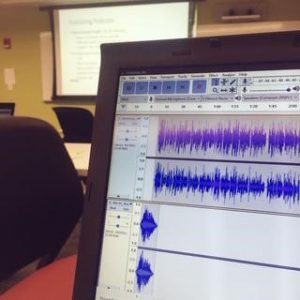 In the 2017 Harvard Chan School Commencement address, speaker Gina McCarthy addressed the audience with a challenge “It’s not enough to do science, you have to speak for the science in ways that non-scientists-aka real people–can understand […] So, as young scientists, take off your lab coats and start practicing this. Go out and talk to people about what you do in the lab, what you learn in the library. Tell them what you know and what it really means to them and to their families.”
In the 2017 Harvard Chan School Commencement address, speaker Gina McCarthy addressed the audience with a challenge “It’s not enough to do science, you have to speak for the science in ways that non-scientists-aka real people–can understand […] So, as young scientists, take off your lab coats and start practicing this. Go out and talk to people about what you do in the lab, what you learn in the library. Tell them what you know and what it really means to them and to their families.”
For then graduating doctoral student Natalie DuPré, this speech made it evident that there was a gap between the work that she and fellow epidemiologists were doing and what was being communicated to the general public.
In the months following McCarthy’s commencement speech, DuPré, along with faculty advisor Earl Francis Cook, Myroslava (Mishka) Makuch, a learning designer, and Sejal Vashi, Manager of Digital Learning at the Harvard Chan School, took it upon themselves to apply for the Harvard Initiative for Learning & Teaching (HILT) Spark Grant. The HILT Spark grant provides an opportunity “for faculty and staff to help ‘spark’ promising teaching and learning projects from idea to reality and position innovations for future success.” Their proposal, titled ‘Development of Student-run Podcasts as an Innovative Learning and Communication Tool’ was one of five projects that were awarded a grant in 2018.
The following is taken from an email exchange with DuPré, now Assistant Professor at the University of Louisville School of Public Health and Information Sciences, (with additional feedback from team members) about the project:
Could you elaborate about what initially brought the team together to submit the proposal? What roles did individual team members play?
Fran, Mishka, Sejal, and I were working as part of the blended MPH in Epidemiology program in various roles, all with a mutual interest in online education. Fran is the director of the MPH Epi program and employed me as Curriculum Fellow. My role was to develop and expand online resources available to the MPH Epi students. The result is a site called the Epidemiology iLibrary. This project required additional expertise and oversight from the Digital Learning team (enter Mishka and Sejal) at the Harvard Chan who are incredibly knowledgeable and effective at creating a user-friendly online learning experience. In this process, an idea emerged in Summer 2017 that podcasts could be a way to engage the online MPH community (both current students and alumni) to continue epidemiologic thinking and learning. As a Curriculum Fellow, I explored podcast development and it was evident to me (at least) that creating podcasts is a creative and engaging learning experience that synthesizes and communicates epidemiologic research in ways that are often lost in the media. It was unknown whether this could be an effective learning tool for students to perform as a class activity, and the HILT Spark Grant offered an opportunity to further explore this; so we applied. It was definitely an organic process and allowed us to expand our team with doctoral students Ruoran Li and MyDzung Chu, and Production Specialist Rick Sheiber.
In terms of the project’s stated goals, as laid out in the proposal, can you tell me what the outcomes have been so far?
- Building a podcasting infrastructure that is conducive and sustainable for student use.
With the HILT funds, we have purchased two Yeti microphones with pop filters (no more puffs on your p’s) that plug directly in to your laptop, one H4N field recorder and accessories that fit nicely in their own case to responsibly carry around to the recording studio. We are currently working with the IT department to create a self-service microphone borrowing and audio recording room reservation process. In the meantime, if you would like to borrow the equipment and or reserve a recording studio, please contact Media and Educational Technology Services (mets@hsph.harvard.edu).
- Develop an on-campus and an online podcasting workshop to train students in podcasting
Approximately 25 people (average age of 29 years old) — from HMS and HSPH departments of Epidemiology, Social and Behavioral Sciences, and Health Policy and Management — attended the Fall workshop and thought that the on-campus workshop were effective or very effective. Based on a pre-workshop versus post-workshop survey data comparison (NOTE: only half of the participants completed the surveys), on average the workshop increased confidence in podcasting storyline development, editing and recording a podcast. At the end of the workshop, three quarters of the survey participants remained interested in creating their own podcast after the workshop. We are currently working on developing an online podcasting workshop.
3. Build a podcast library of student-generated podcasts
This has not materialized yet as we are figuring out ways to have a stronger student engagement.
For members of the Harvard Chan community who are interested in learning more about the project and/or podcasting resources – Who should they contact and what can they look forward to in the near future?
While there are currently no plans to offer another on-campus course as the workshop leaders have left the Boston area, the materials that were used in the on campus workshop are available on the Epidemiology iLibrary (if you would like access, please contact mets@hsph.harvard.edu). We are in the midst of creating an online version of the course that is expected to be available in April 2019.
Anyone interested in finding out more can contact Fran Cook (ecook@bwh.harvard.edu).
photo credit: Eleanor Murray



